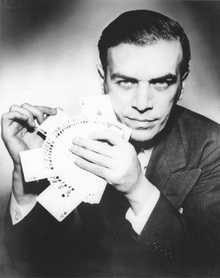
Magician John Scarne: The Ultimate Card Shark
By Joseph “Sonny” Scafetta, Jr.

Credit: Wikipedia
John Orlando Carmelo Scarnecchia was born on March 4, 1903, in Steubenville, Ohio. His parents, Fiorangelo and Maria, had emigrated from what was then called the Abruzzi region. When they became U.S. citizens, the family shortened its name to Scarne. They then moved to Fairview, New Jersey. John quit school after the eighth grade and learned from a local card shark how to cheat as a gambler. He also learned about crooked gambling devices, such as marked cards and loaded dice, at a nearby novelty store. However, his Roman Catholic mother dissuaded him from gambling and persuaded him instead to practice magic. John improved his skill at handling cards by learning and devising magical effects with cards. After much practice, he began earning money as a teen magician on the vaudeville circuit.
After World War I ended in November 1918, Scarne befriended Harry Houdini (1874-1926) who taught the teen many tricks. Soon, Scarne had himself tied up with ropes, placed in a bag, and tossed off a bridge into a river. He quickly freed himself. Articles were written about this stunt in many newspapers and magazines. Soon, he was hired as an advisor by many companies to make demonstrations and to teach lessons so that employees learned to detect frauds. Gradually, he became an expert not only at magical effects but also at all kinds of games. When the United States entered World War II on December 8, 1941, he was too old at 38 for the draft. However, he was hired in 1942 as a consultant by the U.S. Army which sent him to bases around the world to teach soldiers how to detect card sharks and dice cheats.
After World War II ended in August 1945, he published Scarne on Dice which was the first of 15 books that he wrote. He also co-authored 13 more books about games. His notoriety soon had him banned from all casinos in Las Vegas, except for the ones owned by Conrad Hilton who hired Scarne to assist him in identifying blackjack card counters and other cheats. The U.S. Senate created a Committee on Gambling and Organized Crime in 1951, and Scarne was called as “the nation’s outstanding gambling authority” to testify about the ways people are cheated. In 1952, Scarne invented Teeko, the first of three board games in which persons with good math skills won. He married Norma Kearney in early 1955 and a son was born to them before the end of the year. Scarne was so proud of becoming a father at 52 and of the success of his first game that he named his son, John Teeko Scarne. The couple had no more children.
Scarne published his autobiography, The Odds Against Me, in 1966. In 1973 Scarne was the technical advisor for the movie The Sting, and doubled for Paul Newman’s hands in scenes involving deck switching and card manipulation. Scarne authored his last book, Scarne’s Guide to Casino Gambling, in 1978. He died in North Bergen, New Jersey, at 82 on July 7, 1985.
Sources: (all accessed March 15, 2024)
LaGumina et al., The Italian-American Experience: An Encyclopedia, at pages 579-580, Garland Publishing, Inc., 2000.
en.wikipedia.org/wiki/John_Scarne
July/August 2024





